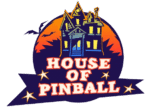If you’ve been browsing the market for a pinball machine for sale, chances are you’ve asked yourself:
Should I buy new or used?
It’s a great question—and one that can impact your overall enjoyment, long-term value, and maintenance needs.
In this post, we’ll break down the key pros and cons of buying new vs used pinball machines, helping you make a confident, informed decision that fits your goals, budget, and lifestyle.
🆕 Buying a New Pinball Machine: Pros & Cons
Modern manufacturers like Stern, Jersey Jack, and Spooky Pinball continue to produce high-quality machines packed with innovation and durability.
✅ Pros of Buying New:
- Warranty Protection
Enjoy peace of mind with manufacturer warranties—usually 1–3 years. - Latest Features
New titles include:- HD LCD displays
- Online leaderboards
- Bluetooth/audio integration
- Complex rule sets and deep code
- Zero Wear & Tear
Everything is pristine—playfield, rubbers, electronics, and cabinet artwork. - Easy Financing & Support
Dealers like House of Pinball offer flexible payment plans and customer support. - Customization Options
Choose from LE (Limited Edition), Premium, or Pro versions—each with unique features.
❌ Cons of Buying New:
- Higher Upfront Cost
New machines can range from $6,000–$15,000+ depending on the model. - Depreciation (Initially)
Like a new car, value may dip slightly after purchase—unless it becomes a collectible.

♻️ Buying a Used Pinball Machine: Pros & Cons
Used machines offer great value—especially when carefully refurbished or maintained.
✅ Pros of Buying Used:
- Lower Cost
Save 30–60% off the original retail price, depending on age and condition. - Classic Titles
Access older games no longer in production—like The Addams Family, Twilight Zone, or Medieval Madness. - More Machines for Your Budget
Stretch your pinball dollar to start or grow your collection. - Proven Track Record
Well-loved titles have a community, rule guides, and upgrade kits available. - Potential Investment
Some used titles appreciate in value, especially cult classics and limited editions.
❌ Cons of Buying Used:
- Risk of Hidden Issues
Wear and tear, ghosting inserts, weak flippers, or board damage can be costly if not disclosed. - No Warranty
Most used machines are sold as-is, unless purchased from a certified reseller like House of Pinball. - Outdated Tech
No connectivity, lower-quality sound, and dimmer lighting compared to new models.
📊 Side-by-Side Comparison
| Feature | New Machine | Used Machine |
|---|---|---|
| Price Range | $6,000–$15,000+ | $2,500–$8,000 |
| Warranty | Yes (1–3 years) | Rare (unless from certified dealer) |
| Features | Modern displays, deep code, WiFi | Simpler rules, nostalgic charm |
| Maintenance | Minimal (initially) | May require repairs or tune-ups |
| Availability | In-stock and orderable | Limited to existing listings |
| Resale Potential | Medium (unless LE or rare title) | High (if collectible) |
🛒 So, Which One Should You Buy?
The answer depends on your goals, skill level, and budget. Here’s a quick guide:
✔️ Go New If You…
- Want zero hassle and long-term reliability
- Prefer modern gameplay features and online integration
- Want warranty coverage and after-sale service
- Are buying as a centerpiece or family gift
✔️ Go Used If You…
- Are shopping on a budget
- Want to collect classic titles
- Are comfortable with minor maintenance
- Value nostalgia or investment potential
🔧 What to Look for When Buying Either Option
Regardless of new or used, always check:
- 🔋 Power supply condition
- 💡 Playfield wear
- 🧠 Board health (look for acid damage or hacks)
- 🎯 Flipper strength & responsiveness
- 📦 Original parts vs aftermarket replacements
At House of Pinball, every machine is tested, cleaned, and prepped for long-term performance. We’ll guide you through every step—whether you’re buying new or used.
💬 Final Thoughts: A Buyer’s Market
The good news? You can’t go wrong when you buy smart.
- New machines offer the latest and greatest in gameplay.
- Used machines give you character, history, and savings.
And with a trusted seller like House of Pinball, you’re never alone in the process.

